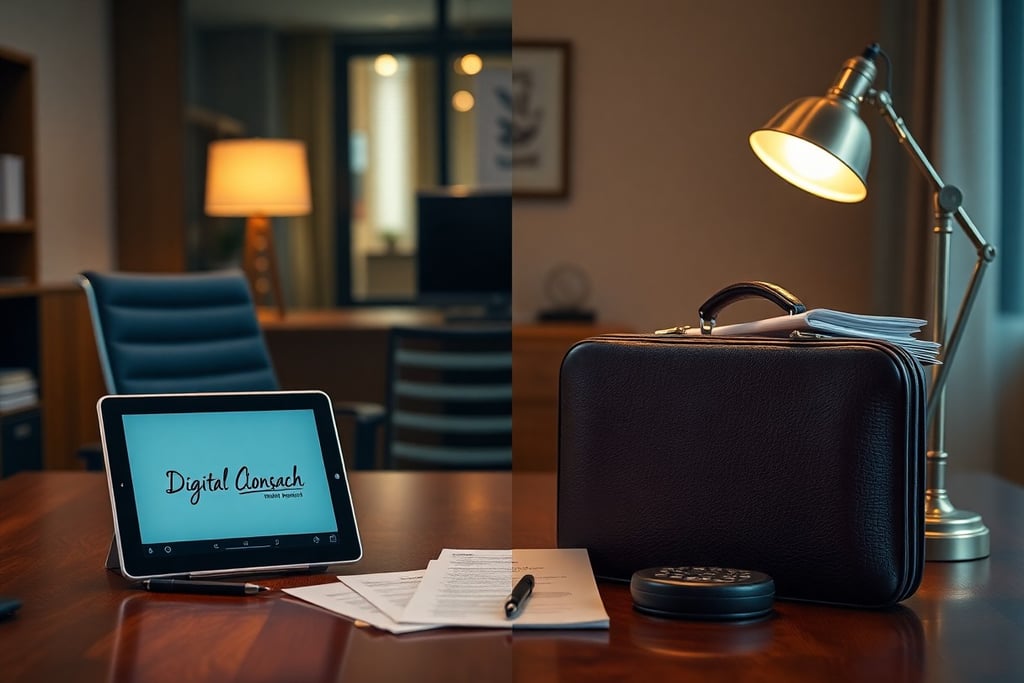Mobile Closings vs Traditional Closings - What's the Difference?
LOAN SIGNING SERVICES
Frank L Coxx
10/24/20256 min read


Mobile closings offer a modern approach to real estate transactions, allowing you to complete closings at your convenience and location. Whereas traditional closings require you to be physically present at a specific location, mobile closings streamline the process with remote options and technology integration. Understanding the differences between these two methods can help you choose the best option for your needs and enhance your closing experience.
Understanding Traditional Closings
Definition and Process
Traditional closings involve in-person meetings where buyers, sellers, and necessary parties finalize the sale of a property. Typically conducted at a title company or attorney's office, this process includes signing documents, transferring funds, and recording the deed. You can expect to review a variety of financial and legal documents, ensuring that all obligations are met before ownership officially changes hands.
Key Advantages
One of the primary advantages of traditional closings is the opportunity for face-to-face interaction. This personal touch allows for immediate clarification of any questions or concerns regarding the transaction. Additionally, having all parties present enhances accountability and can create a more streamlined process.
The physical presence during traditional closings fosters trust and transparency among participants. You may find comfort in discussing complex details directly with your agents or attorneys, rather than relying solely on digital communication. This method ensures that everyone involved understands the terms and conditions, reducing the chances of misunderstanding or disputes later. Furthermore, local expertise from the closing agents can address specific regulations and nuances of your area, providing added assurance as you move forward with your transaction.
Exploring Mobile Closings
Definition and Process
Mobile closings refer to the process of finalizing a real estate transaction at a location convenient for you, often facilitated by a licensed notary or closing agent. Instead of meeting at a traditional office, documents are signed in your chosen setting—be it your home, office, or a local café—where the notary ensures that all legal requirements are simultaneously met. This process typically involves electronic communication, enabling real-time document verification and the seamless transfer of information.
Key Advantages
One of the most significant advantages of mobile closings is the flexibility they offer in scheduling and location, saving you time and reducing stress. You have the option to choose a setting that enhances your comfort, and the process can often be completed more quickly than traditional methods. According to recent studies, mobile closings can reduce the overall closing time by up to 40%, meaning you can enjoy your new property sooner.
Mobile closings streamline the closing process with considerable efficiency gains. By eliminating the need for extensive travel, you save on both time and costs associated with traditional methods. For example, if you’re relocating or juggling multiple commitments, mobile closings’ adaptability can significantly reduce time constraints. Moreover, many closing agents provide digital resources, allowing you to review documents before the meeting. This approach minimizes errors and ensures you are fully informed, enhancing your overall experience with the transaction.
Comparing the Two Approaches
Mobile Closings Traditional Closings Flexible scheduling and location options Fixed location during business hours Utilizes technology for seamless transactions Relies on face-to-face meetings and paper documents Typically faster document processing Potential delays due to scheduling and paperwork
Speed and Efficiency
Mobile closings allow for quicker turnaround times, often completing transactions in a matter of days rather than weeks. This streamlined approach leverages digital tools, enabling immediate access to documents and signatures. Such efficiency can significantly expedite your journey towards property ownership or sale.
Convenience and Accessibility
You’ll find mobile closings significantly enhance convenience, allowing you to complete transactions from virtually anywhere. Without the need to travel for a traditional closing, you can interact with all parties involved using your phone or laptop, at whatever time works best for your schedule.
Mobile closings cater to your busy lifestyle, reducing the stress of coordinating multiple parties' schedules and eliminating the need for travel. You can sign documents at your home, office, or even while traveling, making real estate transactions much more manageable. Being able to access your closing documents online anytime can simplify the process and allow you to focus on what matters most – your new property or sale.
Legal Considerations
Various legal factors differentiate mobile closings from traditional closings. State laws vary regarding electronic signatures, document retention, and the responsibilities of involved parties. Mobile closings typically comply with the same legal standards as traditional methods, but you must ensure that all documents are legally binding and witnessed appropriately to avoid future disputes.
Compliance and Regulations
Your mobile closing process must adhere to both state and federal regulations governing real estate transactions. This includes compliance with specific laws like the ESIGN Act and UETA, which validate electronic signatures. Failing to meet these regulatory requirements could lead to complications, invalidating the transaction and causing delays.
Security Issues
The security of your sensitive information during mobile closings poses significant concerns. Abstracting processes to digital formats introduces risks such as data breaches and identity theft, which necessitate employing secure technology solutions and robust encryption methods to safeguard your personal and financial information.
Investment in high-quality security measures is vital when conducting mobile closings. You should consider platforms that provide end-to-end encryption, two-factor authentication, and secure data storage. For instance, the use of blockchain technology in real estate transactions is emerging as a way to enhance security and transparency. Being aware of these security protocols can help you mitigate risk and protect your interests throughout the closing process.
Cost Analysis
Traditional Closing Costs
Traditional closing costs can often add up, typically ranging from 2% to 5% of the home's purchase price. You might face expenses such as title insurance, appraisal fees, attorney fees, and recording fees, all of which vary by state and local market conditions. Understanding these costs ensures you are financially prepared for the closing process.
Mobile Closing Costs
Mobile closing costs tend to be lower than traditional methods, primarily due to reduced overhead. Generally, you'll encounter fewer service fees since many transactions can be completed digitally. This streamlined process eliminates some in-person requirements, significantly affecting overall expenses.
For instance, while traditional methods may require physical presence and associated costs for attorneys or escrow services, mobile closings utilize online platforms that charge lower fees. You can often expect costs like electronic notarization fees to be significantly less than traditional notary fees. For more insights, refer to What to expect when closing on a house remotely.
Choosing the Right Option
Selecting between mobile closings and traditional closings depends on your personal needs, convenience, and the complexity of the transaction. You may find that mobile notary services offer unparalleled flexibility, while traditional closings provide a more familiar structure. For further insights, check out Mobile Notary vs. Traditional Notary: Which Is Right for You?.
Factors to Consider
Assess several factors to determine the best option for your closing. Think about your schedule, the location of the closing, and the urgency of your transaction. Additionally, consider the complexity of the documents involved and whether a face-to-face meeting can expedite the process.
Time constraints
Distance to closing location
Complexity of documents
Comfort level with technology
Any of these factors can significantly influence your choice between mobile and traditional closings.
Personal Preferences
Your comfort and preferences play a significant role in the decision-making process. If you prefer a hands-on approach with a closer connection to the notary, traditional closings might suit you better. On the other hand, if you value convenience and accessibility, mobile closures could be more aligned with your lifestyle. Personal preference matters just as much as practicality in this choice.
Consider how you typically handle important transactions and meetings. If you enjoy the formality of in-person interactions and feel more secure discussing details face-to-face, traditional closings may offer reassurance. Conversely, if your lifestyle is fast-paced and you often juggle multiple commitments, mobile closings provide the flexibility needed to accommodate your schedule. Prioritizing your personal preferences can lead to a more satisfactory closing experience.
Final Words
Drawing together the differences between mobile closings and traditional closings, you’ll find that mobile closings offer greater flexibility and convenience, allowing you to complete transactions from various locations. In contrast, traditional closings typically require your physical presence and can involve more formalities. Understanding these distinctions helps you choose the option that best fits your needs and lifestyle, ensuring a smoother real estate experience.






